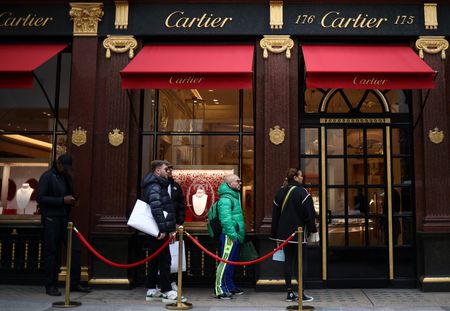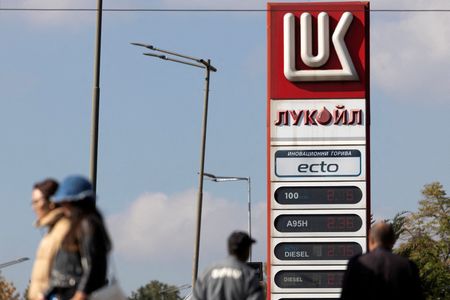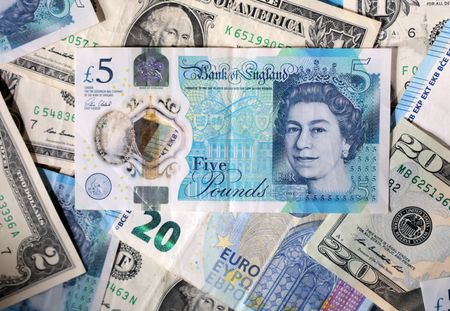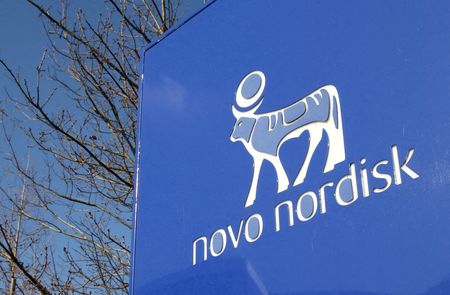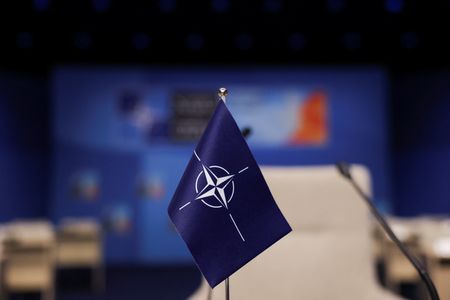By John Revill and Tassilo Hummel
ZURICH (Reuters) -Cartier-owner Richemont reported quarterly sales well ahead of market expectations on Friday, driven by improved demand in China and a robust North American market which helped it weather the hit from U.S. tariffs and high gold prices.
Group sales grew 14% at constant exchange rates to 5.21 billion euros ($6.08 billion), exceeding a consensus estimate of 7% in a Visible Alpha poll of analysts.
Shares in the world’s second-largest luxury group by sales jumped nearly 7% on the result.
Richemont’s sales beat points to a broader brightening outlook in the luxury sector, echoing more positive signals from other luxury houses including industry leader LVMH and Hermes.
Kepler Cheuvreux analyst Jon Cox said that while all regions performed better than expected, China – once the key engine of growth for the luxury sector – was the main driver for the Swiss-based company’s sales growth in the July-September period.
EARLY SIGNS OF IMPROVED DEMAND IN CHINA
The return to growth in Richemont’s sales in China in the quarter was the first positive reading in almost two years, the company said.
Chairman Johann Rupert said on a call after the results he was seeing “some early signs” of improved demand in the country, but cautioned it was too early to speak of a full recovery.
Richemont CEO Nicolas Bos said on a call that Hong Kong and Macau were the main drivers of the improvement, but added that mainland China also showed better signs towards the end of the quarter.
Luxury company executives have been cautious about calling an end to the economic slump in China, which has been struggling to recover from a major real estate crisis. On Thursday, Beijing reported home prices fell at their fastest pace in a year.
Sales in the Asia-Pacific region, Richemont’s most important market dominated by China, rose by 10% at constant exchange rates during the quarter.
RICHEMONT NAVIGATES US TRADE TARIFFS
Richemont is also weathering U.S. trade tariffs and the luxury sector’s recent slowdown better than most rivals due to a steady price policy and exposure to jewellery rather than faster-moving fashion, analysts say.
The U.S. and Switzerland have also edged closer to a trade deal to reduce President Donald Trump’s crippling 39% tariffs on Swiss imports.
The U.S. is Richemont’s biggest single market, generating about 22% of sales. The company’s other brands include watchmakers IWC, Piaget and Jaeger-LeCoultre, as well as jeweller Van Cleef & Arpels.
Richemont executives said the hit from U.S. tariffs on its earnings was low in the first half of the year but could be higher in the second half if the rate is not changed, leading to a potential 300-million-euro ($350 million) hit for the full year.
High gold prices and exchange rates – a weaker U.S. dollar and Chinese yuan, in which Richemont makes most of its sales, paired with a strong Swiss franc needed to pay parts of its production – also weighed on margins.
“We suspect some of these concerns will melt away on this print,” Deutsche Bank analysts said in a note.
Shareholders’ net profit rose to 1.81 billion euros, 1.35 billion more than last year, when Richemont posted a 1.2-billion-euro non-cash writedown of assets held by online luxury portal YNAP, which it sold to digital retailer group MyTheresa.
The company said it had “high expectations and hopes” for the festive season.
($1 = 0.8575 euros)
(Reporting by John Revill and Tassilo Hummel; Additional reporting by Marleen Kasebier; Editing by Clarence Fernandez and Emelia Sithole-Matarise)

